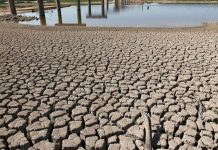THE only source of water feeding Mang’ola ward and the adjacent Lake Eyasi is under threat, following the invasion of unknown people at the Qang’dend forest stream in Karatu district.
The culprits, apparently, uprooted the demarcating beacons that were planted around the water source to protect the area from trespassers in 2015 and proceeded to farm right across the important spring, preventing water from flowing downstream, killing rivers and threatening the existence of Lake Eyasi in the Mang’ola ward of Karatu district, Arusha region.
“The invaders should be hunted down and arraigned before courts of law,” stated the Arusha Regional Commissioner, Mrisho Gambo during the exercise to erect new beacons around the Qang’dend water source after the original ones were destroyed.
A total of 80 beacons were erected around the important source at the threshold of general elections in 2015 and five years later the pillars went missing; some uprooted others destroyed them, but essentially the same precinct they were meant to protect have been invaded by irresponsible farmers.
As the result, Lake Eyasi is on the verge of totally drying, while onion farms downstream also were facing drought.
THE central water basin officer, William Mabula said the government has been compelled to inject 120m/- for the protection of the water source and so far a total of 1000 pillars have been delivered into the area to be erected around the Qangdend water source in Mang’ola.
The area is the major source of fresh onions, due to large vegetable farms located downstream, depending on the water source for their regular irrigation. The 2014 Environment Act No. 20 and the previous one; Act 11 of 2009 as well as the Forest Act No. 14 of 2002, there should a buffer zone of 60 meters from either sides of any water source, free from human activities.
The Karatu District Commissioner, Theresia Muhongo said, onion farms are the economic bedrock activities in her precinct, with the vegetables accounting for 25 per cent of annual income.
“Vegetable farms depend on water from the Qang’dend forest for irrigation, but after the invasion of culprits, the precious liquid flow has been reduced causing onion growers to suffer poor harvests and the government to loose revenues,” maintained the district commissioner.
Other than onion farms, the water source is also the major water supplier to residents of seven local villages including, Magereza; Barazani; Lagangereri; Malekchand; Qangdend; Dumbechan and Geobadg.
Mzee Gitu Philipo is one of the local villagers in the area who revealed that, the farmers who invaded the water source are actually wealthy people with money to throw and this is the reason why they managed to get away with the destructive practices.
“It is not just farmers; but we have people who drive hundreds of their livestock for water at the source and thus causing even more damage to the rivers and the adjacent forest,” claimed Mzee Philipo.







